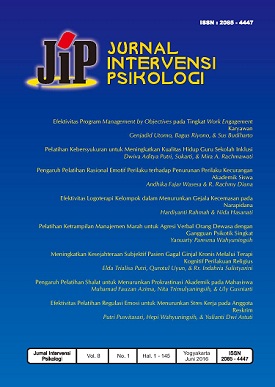Main Article Content
Abstract
The study examined the effectiveness of emotion regulation training to reduce criminal policeman's work stress. This study used a pretest-posttest control group design. The participants were 13 criminal policemen from two different police stations, namely Polda X and Polsek Y. They were men and women aged between 20 - 50 years old, and classified into two groups. One group (n = 6) received emotion regulation training as the experimental group and the other (n = 7) as controlled group (waiting list). Participants were assessed using work stress scale that had been adapted from Abras (2012) research. The result showed that there was a significant difference in the implementation of posttest between the experimental and control group. By using mann whitney, the result concluded that emotion regulation training was significantly effective to reduce work stress of criminal policeman (Z = -2,006, p = 0,045, where p < (0,05).
Key words : work stress, emotion regulation training
Article Details
Authors who publish with this journal agree to the following terms:
- Authors retain copyright and grant the journal right of first publication with the work simultaneously licensed under a Creative Commons Attribution-ShareAlike 4.0 International License that allows others to share the work with an acknowledgment of the work's authorship and initial publication in this journal.
- Authors are able to enter into separate, additional contractual arrangements for the non-exclusive distribution of the journal's published version of the work (e.g., post it to an institutional repository or publish it in a book), with an acknowledgment of its initial publication in this journal.
- Authors are permitted and encouraged to post their work online (e.g., in institutional repositories or on their website) prior to and during the submission process, as it can lead to productive exchanges, as well as earlier and greater citation of published work (See The Effect of Open Access).





